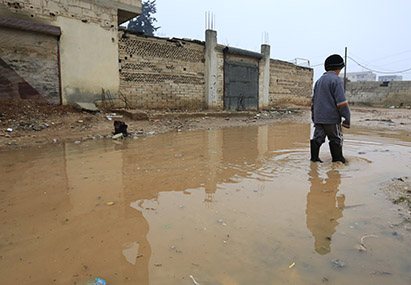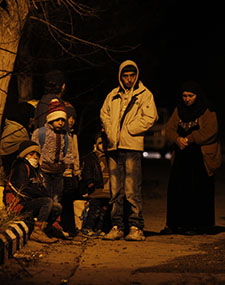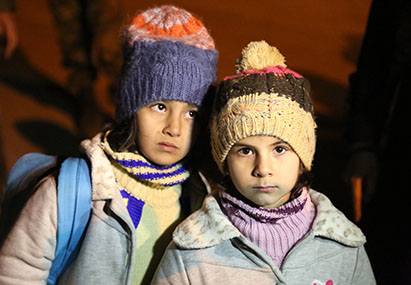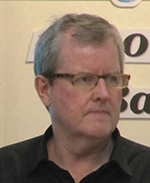A Humanitarian In The Front Line
 |
International Protection Of People Displaced Inside Syria
With Paul White, Senior Protection Officer, OCHA Regional Office for the Syria Crisis Thursday 7 July 2016 |
Copy of Paul White's slide presentation (pdf format)
Many factors conspire to make humanitarian work difficult in Syria. These include the political contradictions amongst the players in the crisis, fragmentation and changing alliances, the politicization of humanitarian work, a changing humanitarian environment where human rights are mostly ignored, the proliferation of sectarian and ethnic cleansing, the movement of Syrians to Europe and a lack of access for humanitarian workers seeking to provide protection inside Syria.
The UN and other humanitarian actors who are working to respond inside Syria have been criticized for being both too close to the government of President Assad and at the same time too close to some forces opposing the government.
Can the UN better respond to assist Syrians who have no chance of leaving? What are the implications of this crisis on the future of humanitarian work?
This lecture will be delivered by Paul White, Senior Protection Officer, working as Adviser to the UN Regional Humanitarian Coordinator for the Syria Crisis.
 |
 |
Paul White

Paul White is an Adelaide lawyer, working in international law since the 1990s. He worked for UNHCR in Asia, Geneva and Darfur, before becoming a Senior Protection Officer with the UN interagency Protection Project – ProCap (Protection Capacity).
In this role he works with UN agencies, such as UNICEF and UNHCR, to build local capacity and provide strategic advice – essentially working to protect civilians in countries experiencing conflict. Countries where he has been deployed include, Iraq, Dohuk (Kurdish Region of Iraq near the border of Syria and Turkey), South Sudan, Myanmar, Nepal, Uganda and Sudan.
Paul has recently returned from a deployment as Protection Adviser to the Regional Humanitarian Coordinator for the Syria Crisis where he was based in UNOCHA. He roved between Amman Jordan, Gaziantep Turkey and other places working on the UNs cross border protection response in opposition held areas. He also travelled to Damascus Syria to assist the UN teams working with displaced people in government areas in Syria – where there are 6 million displaced persons. Among others issues, he worked on: children affected by armed conflict; sexual and gender based violence; mine action; civil documentation, and ensuring the inclusion of the most vulnerable beneficiaries in UN distributions.
Further information:
|
|
|||
|
Presented by The Bob Hawke Prime Ministerial Centre |
|||
Photo credit: UNICEF
While the views presented by speakers within the Hawke Centre public program are their own and are not necessarily those of either the University of South Australia or The Hawke Centre, they are presented in the interest of open debate and discussion in the community and reflect our themes of: strengthening our democracy - valuing our diversity - and building our future.
The copying and reproduction of any transcripts within the Hawke Centre public program is strictly forbidden without prior arrangements.





